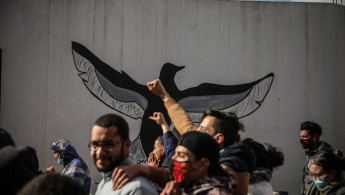Tunisia's Banksy marks Tunis' walls with parody of constitution
"The real constitution is the one that the youth write on the walls," said Tunisia's president Kais Saied when first elected in 2020.
Three years later, a Tunisian artist is realising Saied's statement after the president took it upon himself to unilaterally write a controversial constitution which tightened his power grab.
Akin to Banksy's style, parody articles of Tunisia's constitution appeared on a random wall in the capital Tunis.
"Article 1: Tunisia is an authoritarian state," "Article 2: Tunisia is a country based on the will of the police and the law of the jungle," read the writings in blue and red Arabic-calligraphic style that went viral on social media.
شاب تونسي يكتب "دستور تونس المتخيل" على الجدران #تونس #شباب pic.twitter.com/gCeTQP5ziC
— Wejdene Bouabdallah (@tounsiahourra) November 5, 2022
The melodrama of Saied's constitution has gripped the state for more than two years now.
President Saied, a former constitutional law professor, invoked article 80 of the 2014 constitution last year, which authorises the president to take "any measures necessitated" in case of an "imminent threat jeopardising the nation, and the country's security and independence." He promised at the time a constitution that represents "the people".
Despite little hope in Saied's promised new constitution, many Tunisians have given the president the benefit of the doubt. That soon faded after Saied made public on 30 June a controversial draft that sets up a powerful executive akin to autocracy.
Sadok Belaid, the chairman of the constitution commission, appointed by the president, bluntly disowned the public draft, saying it was revised by Saied.
In August, Saied's constitution was passed with a low turnout. But with no minimum participation rate requirement, it is now set to become law
The controversial text would move Tunisia towards a more presidential system under which Saied would have ultimate authority over the government, judiciary and army.
The artist behind "the constitution street art" remains unknown. A choice that may not be only artistic but also a safety net as attacks on anti-Saied activists increase.
Since Saied's power grab last year, military courts have prosecuted 12 civilians, mainly for online post cases.
42 journalists have been targeted in the country since the start of 2022.
Former politicians leaders, whom Saied laid sacked amid his power grab, are prosecuted for multiple charges and banned from leaving the country.
Since the fall of former president Zine el Abidine Ben Ali, more and more Tunisian street artists have started reclaiming public spaces once tightly controlled by the police and secret services.
During the Jasmine revolution in 2011, every wall seemed to echo the revolution's chants making it harder for the regime to control anti-Ben Ali voices.
Today, a deja-vu of Ben-Ali's regime has permeated the country, with democracy, freedom of speech and street art all under attack.
"Back then, artists used to play cat and mouse with the police. Today, fear of getting arrested is driving many artists to stick to colourful paintings and portraits," Ismail, a young Tunisian street artist, told The New Arab.
"I am not saying colourful paintings are bad, but they just don't voice the Tunisian landscape. Tunisia today is not colourful. (...) It is afraid, angry and starving," added the young artist.





 Follow the Middle East's top stories in English at The New Arab on Google News
Follow the Middle East's top stories in English at The New Arab on Google News


